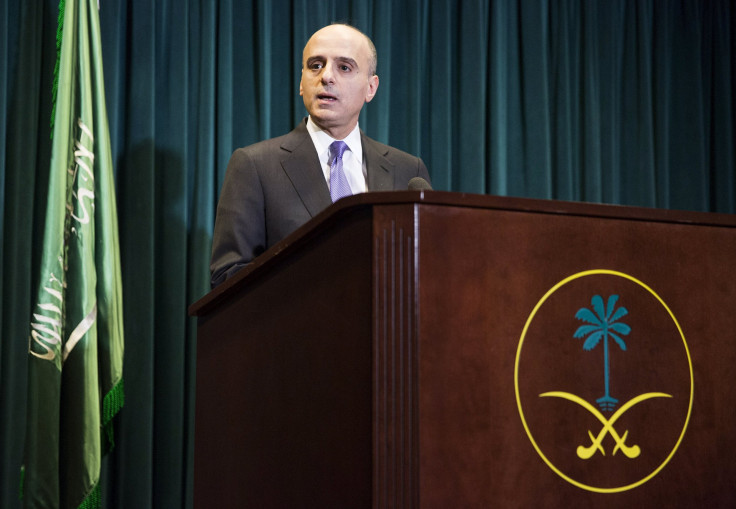Saudi Arabia Launches Military Operations Against Houthi Rebels In Yemen; At Least 17 Civilians Dead

Update as of 4:40 a.m. EDT: At least 17 civilians have been killed in the Yemeni capital, Sana'a, after Saudi jets bombed the city Thursday, in a bid to tackle Houthi rebels, who have taken control of vast swathes of the country and driven President Abed Rabbo Mansour Hadi into hiding, according to media reports.
Agence France-Presse reported that 17 civilians had been killed in the bombing. Other media reports suggested that the number of civilian deaths could be as high as 25. Some reports suggested that 40 people have been injured in the airstrikes, though these numbers have yet to be confirmed. Al-Masirah television said civilian casualties included women and children, according to ITV News.
Iran condemned the Saudi-led strikes in Yemen on Thursday, calling the action "a dangerous step" that violated "international responsibilities and national sovereignty," Lebanon's Daily Star reported.
Broadcaster al Arabiya TV reported that Saudi Arabia was contributing up to 150,000 troops and 100 warplanes to the operations. In addition, Jordan, Egypt, Sudan and Pakistan were ready to take part in a ground offensive in Yemen, it said, according to Reuters.
The international military operation targeting the Houthi rebels, codenamed "Decisive Storm," may also have succeeded in killing some of the rebel group's military commanders.
Al Arabiya reported that commanders Abdel Khalik Al-Houthi, Yousef al-Madani and Youssel al-Fishi were killed in airstrikes conducted by Saudi Arabia and the UAE. Al Jazeera reported that Houthi sources had denied that Mohamad Al-Houthi, the head of the Houthi Revolutionary Council, had been injured in an airstrike.
All reports of deaths and injuries remain unconfirmed.
A statement issued by the National Security Council's Bernadette Meehan said that the U.S. will support actions taken by Gulf Cooperation Council (GCC) member states, but that no U.S. troops will be involved in direct military action in Yemen.
The statement said that in addition to Saudi Arabia's military intervention, other GCC states and unspecified others will be involved in military action in the country. The statement stipulated that foreign military intervention in Yemen has come at the request of the country's president, Abdo Rabbo Mansour Hadi.
The U.S. will also establish a Joint Planning Cell with Saudi Arabia to coordinate U.S. military and intelligence support.
The administration will continue to closely monitor the threat posed by al Qaeda in the Arabian Peninsula, and take action when necessary to disrupt terrorist threats against the U.S. and its citizens, the statement added.
In other developments, Houthi-controlled television in Yemen is broadcasting pictures showing what it claims to be a Saudi plane shot down over the capital, Sana'a, according to social media reports.
HUGE. Houthi led TV shows the first #Saudi jet shot down over San'aa #Yemen. Fighters are searching for the pilot . pic.twitter.com/Dqw11WnECe
- Muhammad Ali (@Klaashinkof) March 26, 2015The downing of a Saudi jet has not been confirmed. Neither have other reports on social media that claim more than one of the Kingdom's jets have been shot down since operations began earlier this evening.
Original story below
Saudi Arabia has begun military operations against Houthi rebels in Yemen, the country's ambassador to the U.S. announced late Wednesday.
Ambassador Adel al-Jubeir said that the operations, which consisted of airstrikes against more one Yemeni city, began at 7 p.m. ET. In a news conference, he added that the Saudi authorities "will do anything necessary" to protect the people of Yemen and "the legitimate government of Yemen," the Associated Press reported.
The Saudi intervention comes as Abdu Rabbu Mansour Hadi, Yemen's embattled Saudi- and U.S.-backed president, has reportedly gone into hiding, as Houthi rebels captured territory in the port city of Aden. Hadi had sought refuge there since he was released from a months-long period of house arrest in the capital Sana'a.
There are conflicting reports as to Hadi's current whereabouts. Houthi spokesman Mohammed Al-Bukhaiti told CNN that Hadi left Aden on Wednesday with a Saudi diplomatic team as the rebels approached the city. Other unconfirmed reports suggested that Hadi had fled to neighboring Djibouti by boat.
"We were in touch with him earlier today," State Department spokeswoman Jen Psaki told Reuters. "He is no longer at his residence. I'm not in position to confirm any additional details from here about his location."
Earlier Wednesday Houthi rebels, backed by units of the country's military loyal to ousted former leader President Ali Abdullah Saleh, seized control of Aden's airport, and a nearby airbase that until last weekend was host to a contingent of U.S. special operations forces.
With assistance from Saleh, the Houthis now control most of the Yemeni military, including its air force, giving them a decisive advantage over Hadi’s forces, the New York Times reported.
The Saudi intervention in Yemen raises the prospect of regional powers using Yemen as a battleground for a proxy war. The Houthi rebels are Shiite Muslims, a minority in Yemen. They have however, received support from Shi'a-majority Iran. Sunni Saudi Arabia has fractious relations with Iran, and has long been keen to check its regional influence.
Yemen is also a key regional theater for U.S. operations against Islamic militant groups, especially al Qaeda in the Arabian Peninsula. President Hadi's government had hosted U.S. forces in the country, and allowed drone attacks to target and kill militants in the country. With the pro-U.S. government no longer in control of vast swathes of the country, the Obama administration will face a challenge in formulating an effective counter-terrorism policy in the country.
© Copyright IBTimes 2024. All rights reserved.












